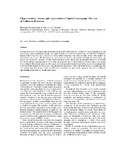| dc.contributor.author | Rankokwane, B. | |
| dc.contributor.author | Gwebu, T.D. | |
| dc.date.accessioned | 2009-09-08T09:26:37Z | |
| dc.date.available | 2009-09-08T09:26:37Z | |
| dc.date.issued | 2006 | |
| dc.identifier.citation | Rankokwane, R. & Gwebu, T.D. (2006) Characteristics, threats and opportunities of landfill scavenging: the case of Gaborone, Botswana, GeoJournal, vol. 65, number 3, pp. 151-163 | en_US |
| dc.identifier.issn | 0343 2521 | |
| dc.identifier.uri | http://hdl.handle.net/10311/362 | |
| dc.description.abstract | In Gaborone, as in other large cities in the developing world, individuals try to make a living by engaging in novel occupations such as landfill scavenging. This paper reports on a research conducted in the Gaborone landfill, the largest in Botswana. The study content-analyzed available literature from other countries. It also relied mainly on direct field observations. The discussions on and answers to closed and interview schedules by stakeholders, affected- and- interested – persons, provided the information on the threats and opportunities related to the landfill site and its informal management activities. This on-going case study lends credence to the potential of scavenging in sustaining livelihoods among those who cannot secure employment in the formal urban market. Scavenging tends to be useful although it may hazardous to the informal entrepreneurs. Taking all the threats into consideration, the decommissioning and closure of the landfill seems inevitable, in spite of the apparent short-term livelihood opportunities it provides to the informal sector. | en_US |
| dc.language.iso | en | en_US |
| dc.publisher | Springer, www.springerlink.com/index/52P6472307264K5M.pdf | en_US |
| dc.subject | Botswana | en_US |
| dc.subject | landfilling | en_US |
| dc.subject | waste management | en_US |
| dc.subject | scavenging | en_US |
| dc.title | Characteristics, threats and opportuinities of landfill scavenging: the case of Gaborone, Botswana | en_US |
| dc.type | Published Article | en_US |

